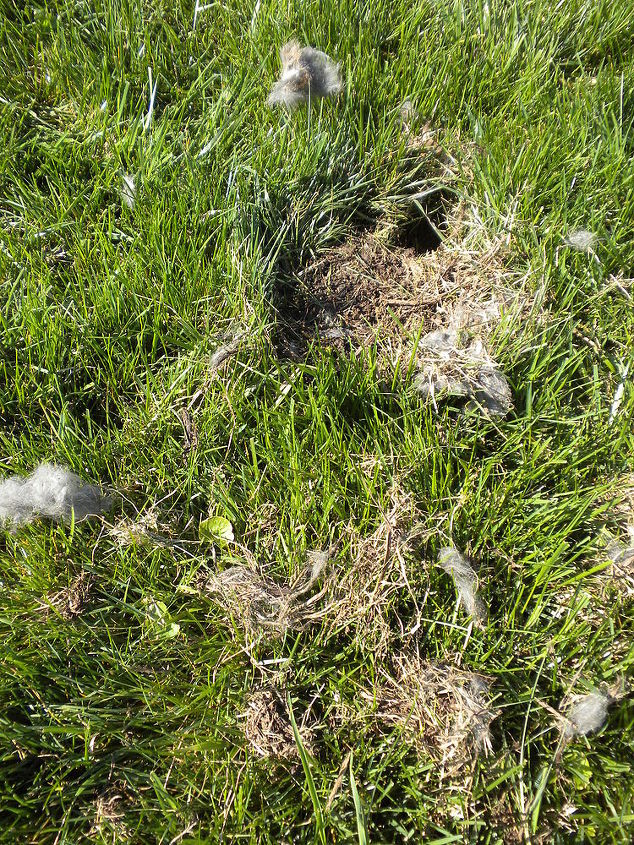Spider webs under patio furniture
Related Discussions
GNATS - How to get rid of them?
Somehow my house and garden got tiny gnats that killed my fuchsia plant and fly everywhere. I have tried ALL the Web recommendations - soap and oil dishes, sand in th... See more
Marigolds growing! Should I pinch the buds?
My marigold plants are growing. I heard that pinching the buds until Autumn will allow them to grow without killing the plant. Is this true?
Growing garlic
Growing our first garlic, should we wait until the leaves are drying out before we pick it? Husband picked first one today along with our first potatoes.
How to keep mice out of your garden?
Hi everyone, I have mice in my garden destroying my vegetables and I have also noticed them in the barn and shed. Please can someone tell me how to prevent them from ... See more
What's the best flower/plant to grow in Texas?
I know that opinions vary, but what's your opinion?!I have great luck w Rosemary plants. Green all year long.
Can someone tell me what kind of animal this was in my yard?
I thought maybe a rabbit was burrowing in my yard, but it's almost dead center of my lawn (not a very smart rabbit). The hole is not very deep, and I replanted it onc... See more
Is Creeping Charlie in your lawn a good thing or a bad thing?
Is there a sure-fire way to get rid of Creeping Charley?





https://www.hunker.com/12595878/how-to-keep-spiders-from-living-on-patio-furniture
Any mint essential oil detracts them. They smell through their feet so the more you make them not like where they are the faster they will leave. Hope that helps.
https://www.google.com/search?q=spiders+smell+with+their+feet&rlz=1C1BLWB_enUS700US700&oq=spiders+smell&aqs=chrome.1.69i57j0l5.5357j0j1&sourceid=chrome&ie=UTF-8
Spiders detect smell with scent sensitive hairs located on their legs. A sense of taste in their mouth is missing. A spider feels her prey with chemo sensitive hairs on her legs and senses if the prey is consumable.
Spiders hate peppermint. Spray with a mixture of peppermint oil and water.
Try spraying oil of marigold.
I would clean more often, and put some Moth Balls under it. The Moth Balls do no harm to any our plants. Enjoy, J.
Control of spiders is best achieved with an integrated pest management (IPM) approach that includes multiple tactics for prevention, exclusion, and population reduction. Since the type of spider will determine the necessary control actions, start by identifying the spider involved.
Spiders are not generally harmful. Tolerance for spiders and simple capture and removal are recommended whenever possible. However, dangerous spiders such as the black widow and brown recluse, both very rare in the upper Midwest, require immediate attention and control.
Eradication of all spiders from a home is difficult and unnecessary. Properties located in areas favorable to spiders, such as by rivers, lakes, or fields, are more likely to have large numbers of spiders. Spiders also will be more numerous in areas with a large supply of insects that serve as a food source for spiders.
Each situation is unique, but the following guidelines describe the integrated techniques that can be used to control spiders.
Use the following techniques if accidental invasion by wandering spiders from outdoors is a frequent problem or to reduce an unacceptable number of spiders around your home and prevent spiders from getting inside. Otherwise, spider control in the lawn, landscape, and garden is not recommended because spiders are beneficial and an important component of the ecosystem.
As a last resort, lightly apply a broad-spectrum insecticide labeled for the exterior of buildings on the outside of your home to reduce invasion by wandering spiders. Spray under siding, in cracks and crevices, and other places where spiders may hide. General treatments on the siding or other surfaces are not effective. Read and follow all pesticide label directions.
Indoors:
Regular housecleaning is very important in the control of spiders indoors. Large, persistent spider populations indoors indicate the presence of a significant insect population that serves as their food.
You can supplement your sanitation efforts with an insecticide treatment. Lightly apply insecticide to cracks, gaps, and other places where spiders may hide. General treatments on surfaces and fogs are not effective. Most insecticides labeled for ants and cockroaches are also labeled for spiders. These products are commonly found in ready-to-use aerosol and liquid formulations. CAUTION: Read all label directions carefully before buying insecticides and again before using them.
Wipe underneath with a cloth or sponge with AVON Skin So Soft on it. Keeps furniture nice and insects HATE the smell. There are now three scents to choose from, but I prefer the original. It has been am insect deterrent for over 60 years!